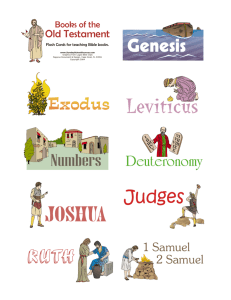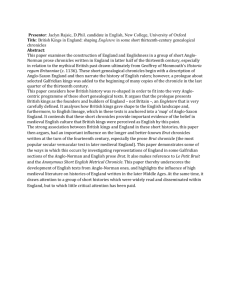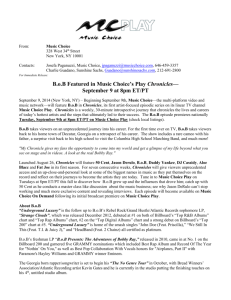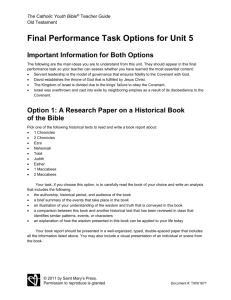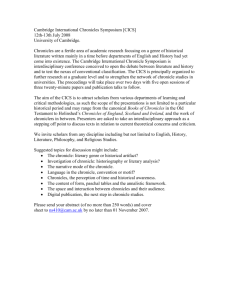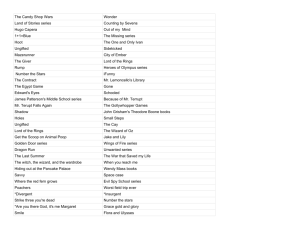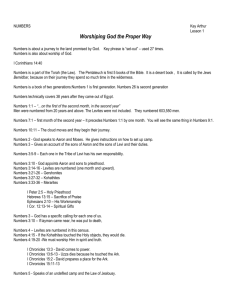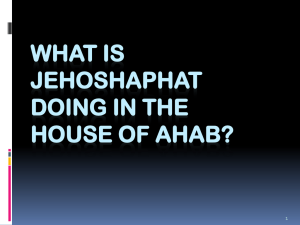Chronicles - Berachah Bible Church
advertisement
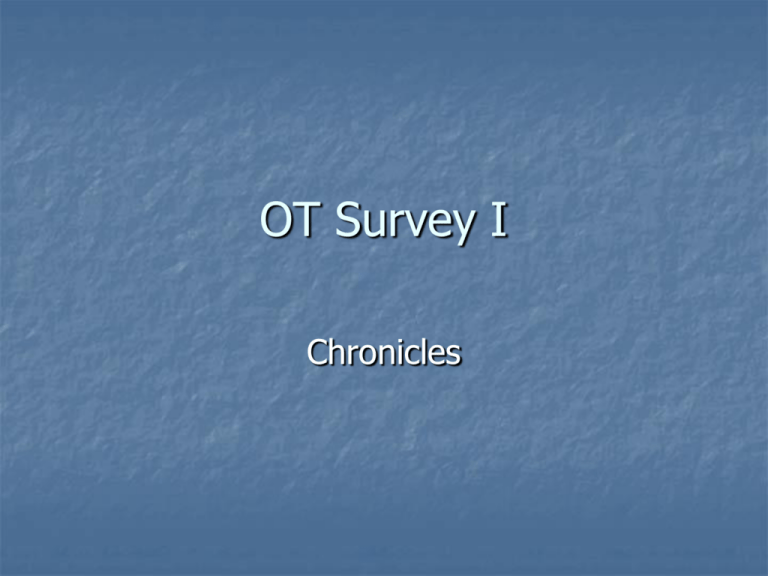
OT Survey I
Chronicles
Author and Date of Chronicles
“Jeremiah wrote the book which bears his name, the
Book of Kings, and Lamentations. Hezekiah and his
colleagues wrote Isaiah, Proverbs, the Song of
Songs and Ecclesiastes. The Men of the Great
Assembly wrote Ezekiel, the Twelve Minor Prophets,
Daniel and the Scroll of Esther. Ezra wrote the book
that bears his name and the genealogies of the
Book of Chronicles up to his own time. This confirms
the opinion of Rab, since Rab Judah has said in the
name of Rab: Ezra did not leave Babylon to go up to
Eretz Yisrael until he had written his own genealogy.
Who then finished it [the Book of Chronicles]? —
Nehemiah the son of Hachaliah.”
Baba Bathra, 15a
Author and Date of Chronicles (cont…)
“As the chief architect of the spiritual and
moral revival of the Second Commonwealth,
he would have had every incentive to produce
a historical survey of this sort. As a Levite
from the priestly line, his viewpoint would
have been in perfect agreement with that of
the author of this work, and he would be very
apt to lay the stress just where the Chronicler
has.”
Gleason L. Archer, Survey of OT Introduction, p. 450
Author and Date of Chronicles (cont…)
2 Chronicles 36:22-23 = Ezra 1:1-3a
Another argument for Ezra as the author?
A terminus a quo for the date of writing: 538 BC
1 Chronicles 3:24 – Some generations after
Zerubbabel (his grandsons?)
966 – Solomon’s 4th year
1446 - Exodus
538 – Cyrus’
decree
586 – Babylonian
captivity
Thus, the author is unknown but possibly Ezra, and
the date is sometime around the 5th century BC
Location of Chronicles in Canon
English
Hebrew
[Torah]
[Historical Books]
Joshua
Judges
Ruth
Samuel
Kings
Chronicles
Ezra/Neh/Est
[Former Prophets]
(Joshua through Kings)
[Latter Prophets]
(Isa, Jer, Ezek, 12)
-
[Writings]
Psalms/Job/Proverbs
Megilloth (The 5 Scrolls)
Daniel/Ezra-Nehemiah
Chronicles
Location of Chronicles in Canon (cont…)
“Few Old Testament books are as easy to
underestimate as is 1-2 Chronicles. Many
readers dismiss it as a needless repetition or
mere supplement to Samuel and Kings.
Others are nonplussed by its extensive
opening genealogies, by its length or by its
supposedly simplistic view of Israelite history.
Even theologians are prone to dismiss the
book too lightly. For example, Gerhard . . .
Location of Chronicles in Canon (cont…)
. . . von Rad says, ‘One cannot avoid the
impression of a certain mental exhaustion—at
least in the way the material is presented.
And in theological clarity too, in consistency
and inner unity, the Chronicler is not nearly
the equal of the Deuteronomistic work.’ Such
comments do not do justice to the breadth
and vision that the book exhibits. Rather than
being a repetitious, unimaginative work, . . .
Location of Chronicles in Canon (cont…)
. . . this history provides an excellent
conclusion to the canon by drawing together
its major themes and presenting them in an
effective, creative, and historically accurate
manner. The book has a canonical awareness
that makes it important for grasping the
whole message of Old Testament theology.”
Paul House, Old Testament Theology, p. 523
Chronicles – A New Perspective
1) Time period – The beginning of time
until Cyrus (C) vs. the beginning of
kingship until the end of it (S/K)
2) Outlook – Positive and hopeful (C) vs.
negative and uncertain (S/K).
Very little ink spent on negative things.
Extra ink spent on positive things.
Revealing differences in parallel contexts (e.g.,
the Davidic Covenant)
Chronicles – A New Perspective (cont…)
3) Direction – Looking forward (C) vs.
looking back (S/K)
4) Purpose – Encouragement (C) vs.
Conviction (S/K).
Reading Samuel and Kings should result in
tears. Reading Chronicles should result in
sweat.
Purpose Statement of Chronicles
The exile has ended and God has begun to
fulfill the good words of the prophets.
Israel should come together as a nation
and prepare for a new covenant and the
restoration of their kingdom by establishing
proper worship and pursuing faithful
obedience with all their heart.
Major Themes*
Unity of All Israel
“All Israel” anoints David at Hebron, not just
Judah (1 Chr 11:1)
Emphasis on all twelve tribes supporting David in
unison, whereas in Samuel there is seemingly
constant friction (1 Chr 12:23-38)
Several texts show residents of northern Israel
recognizing the legitimacy of Judah and
defecting (2 Chr 11:13-14; 15:8-9)
Several texts show reforms of Judah reaching
north (2 Chr 19:4, 8; 30:1, 6, 10, 11, 18; 31:1;
34:6-7, 9)
*Cf. David M. Howard Jr., Intro to OT Historical Books
“All Israel”
“The term all Israel occurs at least 105 times in
biblical Hebrew. Almost 40 percent of these
references occur in 1 & 2 Chronicles: forty times!
This statistic alone shows the prominence of this
idea in the two books. . . . An even more revealing
statistic comes from noticing that in only six cases
does the Chronicler use the phrase exactly as it
appears in his sources. In twelve cases the
Chronicler, in using the phrase ‘all Israel,’ changes
his underlying source slightly. The underlying phrase
usually is something such as ‘Israel’ or ‘all the tribes
of Israel,’ which the Chronicler has changed to . . .
“All Israel” (cont…)
. . . the more standardized ‘all Israel.’ In twenty-two
cases, the Chronicler uses the phrase on his own, so
to speak; it comes in material he has added, that is
not found in 2 Samuel or 1 & 2 Kings. Sometimes, it
is only a small insertion (of a verse or even a
phrase), and the phrase ‘all Israel’ is found within
the insertion. . . . Strikingly, fourteen of the
references to ‘all Israel’ come in 2 Chronicles 10-36,
after the death of Solomon, when ‘Israel’ was no
longer a unified entity. Even more strikingly, five
references come in chaps. 29-36, after the fall of the
northern kingdom, when there was no political . . .
“All Israel” (cont…)
“. . . entity called ‘Israel’ at all. This shows that the
term’s use is more than merely accidental in
referring to the united kingdom; it is an integral part
of the Chronicler’s vision of things. He conceived of
‘Israel’ as an indivisible unity, which was God’s
people in its entirety, and one that still had a place
in God’s plans for the future.
David M. Howard, Jr., Introduction to the OT Historical Books, pp. 255-256
Major Themes (continued…)
The tribes of Judah and Levi
Davidic Kingship
Especially David’s relationship to the temple and
Israel’s system of worship
Temple and Worship
Constantly the centerpiece of the book’s units
David’s and Solomon’s participation
All good kings focus on this
Asa repaired the altar (2 Chr 15:8)
Joash restored the temple (2 Chr 24:4-14)
Jotham built its upper gate (2 Chr 27:3)
Hezekiah did extensive repairs (2 Chr 29-31)
Josiah repaired it and celebrated Passover (2 Chr 34-35)
Note Abijah’s speech in 2 Chr 13:10-12
Major Themes (continued…)
Reward and Punishment
1 Chronicles 28:9 As for you, my son
Solomon, know the God of your father, and
serve Him with a whole heart and a willing
mind; for the LORD searches all hearts, and
understands every intent of the thoughts. If
you seek Him, He will let you find Him; but if
you forsake Him, He will reject you forever.
Reiterated in 2 Chr 12:5; 15:2; 24:20
See also 2 Chr 7:14 and examples listed in
Howard, p. 263.
Major Themes (continued…)
The Heart
“‘With a perfect heart’ or ‘with all the heart’
occurs 21 times, only three of which come
from a parallel in 1 & 2 Kings” (Howard, p.
264).
“[In Hezekiah’s reign,] the term heart occurs
eleven times in 2 Chronicles 29-32. In none of
these occurences in chapters 29-32 is the
reference to the heart found in the parallel in
2 Kings” (Howard, p. 265).
Purpose Statement of Chronicles
Especially end of 2 Chronicles (4 references to Jeremiah)
The exile has ended
and God has begun to
“All Israel”
Davidic Kingship
fulfill the good words of the prophets.
Israel should come together as a nation
and prepare for a new covenant and the
restoration of their kingdom by establishing
proper worship and pursuing faithful
obedience with all their heart.
The Heart
Reward and Punishment
Temple and worship
Good Resources on Chronicles
David M. Howard, Jr., An Introduction to
(Moody Press, 1993).
{Very good on the themes of Chronicles}
David A. Dorsey, The Literary Stucture of
the Old Testament Historical Books
the Old Testament: A Commentary on
Genesis-Malachi (Baker Books, 1999).
{Very good on the structure of Chronicles}
Paul House, Old Testament Theology
(InterVarsity Press, 1998).
{Very good on the canonical location of
Chronicles}
January 11, 2015
Ezra/Nehemiah
